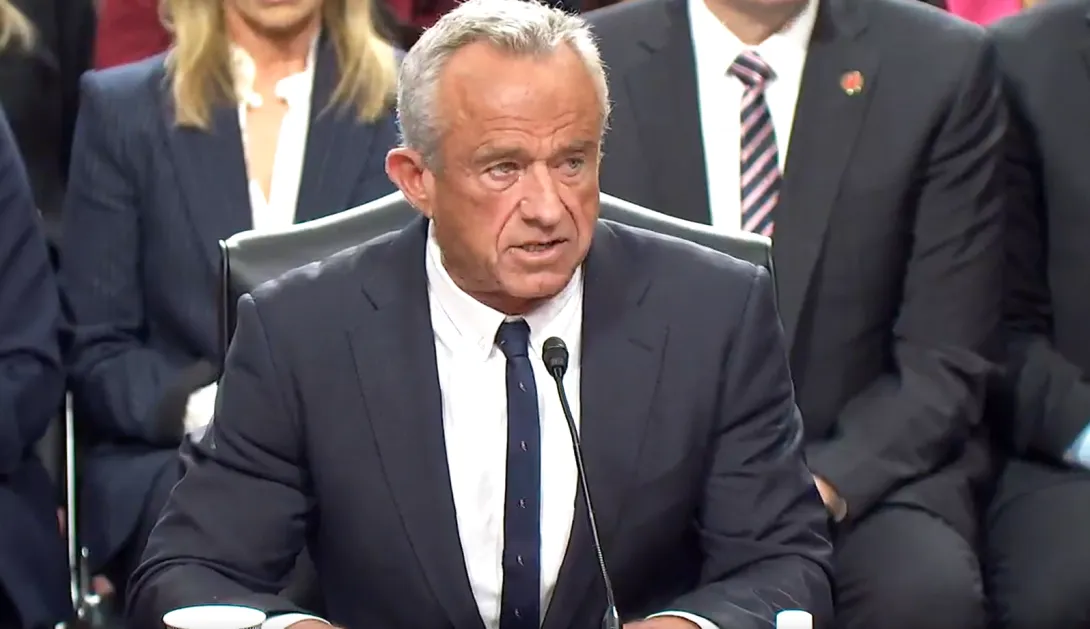
RFK Jr. speaks before the Senate Finance Committee during his confirmation hearings.
Photo: Senate Finance Committee screen shot
Health and Human Services Secretary Robert F. Kennedy Jr. has fired the 17 members of the Advisory Committee for Immunization Practices and accused them of violating conflict-of-interest rules in receiving "substantial funding" from pharmaceutical companies, he wrote in an op-ed that ran Monday in The Wall Street Journal.
"Today, we are taking a bold step in restoring public trust by totally reconstituting the Advisory Committee for Immunization Practices (ACIP)," Kennedy wrote. "We are retiring the 17 current members of the committee, some of whom were last-minute appointees of the Biden administration. Without removing the current members, the current Trump administration would not have been able to appoint a majority of new members until 2028."
ACIP is an advisory committee of the Centers for Disease Control and Prevention. It evaluates the safety, efficacy and clinical need of the vaccines.
WHY THIS MATTERS
Kennedy, who has been called a vaccine skeptic and anti-vaccine, said ACIP has failed to scrutinize vaccine products given to babies and pregnant women.
"To make matters worse, the groups that inform ACIP meet behind closed doors, violating the legal and ethical principle of transparency crucial to maintaining public trust," Kennedy wrote.
"The committee has been plagued with persistent conflicts of interest and has become little more than a rubber stamp for any vaccine," Kennedy said. "It has never recommended against a vaccine – even those later withdrawn for safety reasons."
In 2000, the House issued the results of an investigation of ACIP and another vaccine advisory committee, the Vaccines and Related Biological Products Advisory Committee which operates under the U.S. Food and Drug Administration, Kennedy said.
"It found that enforcement of its conflict-of-interest rules was weak to nonexistent. Committee members regularly participated in deliberations and advocated products in which they had a financial stake," Kennedy said.
"Four out of eight ACIP members who voted in 1997 on guidelines for the Rotashield vaccine, subsequently withdrawn because of severe adverse events, had financial ties to pharmaceutical companies developing other rotavirus vaccines," Kennedy said. "A 2009 HHS inspector-general report echoed these findings."
Few committee members completed full conflict-of-interest forms, and the CDC took no action to remedy the omissions, he said.
"Most of ACIP's members have received substantial funding from pharmaceutical companies, including those marketing vaccines. The problem isn't necessarily that ACIP members are corrupt. Most likely aim to serve the public interest as they understand it. The problem is their immersion in a system of industry-aligned incentives and paradigms that enforce a narrow pro-industry orthodoxy."
THE LARGER TREND
In February, the American Medical Association was among 50 healthcare organizations asking Kennedy to reschedule a meeting of the Advisory Committee of Immunization Practices.
The meeting, scheduled for Feb. 26, was postponed to accommodate public comment in advance of the meeting, HHS said at the time. Kennedy was confirmed to lead HHS on Feb. 13.
The meeting was rescheduled to April 15 and 16. ACIP met and voted to recommend several vaccines including expansion of the use of any age-appropriate RSV vaccine to include adults aged 50-59 years at increased risk of severe RSV disease.
Email the writer: SMorse@himss.org